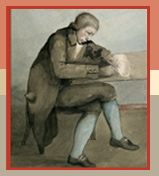Carmarthen (Caerfyrddin)
The first provincial eisteddfod to be held under the auspices of the Cambrian Societies and Bishop Thomas Burgess, bishop of St David's from 1803 to 1825, was held in Carmarthen in 1819. Elijah Waring, in his volume of anecdotes about Iolo, Recollections and Anecdotes of Edward Williams, relates the events exactly as he had heard them from Iolo. The Gorsedd ceremony was held at the Ivy Bush hotel in the town (see Waring's description, below). This eisteddfod was a turning point in the history of the Gorsedd since it was the first time that Gorsedd activities were held during an eisteddfod. As a result of the link forged between the two institutions, the Gorsedd earned much popularity and respectability.
The location in Carmarthen was important to Iolo because of the town's real and imagined historical links with the Welsh bardic tradition. The area was known as 'talaith Dinefwr' (the province of Dinefwr) by Wales's medieval bards, but since Carmarthen had hosted one of the most prominent eisteddfodau of the genuine bardic tradition c.1453, the town came to play a key role in Iolo's bardic story. For Iolo, this important location meant that in 1819 history had come full circle and, indeed, he alluded to the famous medieval eisteddfod in the proclamation he made to the poets:
Ac yn yr Eisteddvod hon ... barnwyd yn unvryd unllais, heb nâg na gwrtheb na llaw na thavawd, bod y Rheithiadau Cerdd a vreiniwyd yn Eisteddfod Caer Vyrddin yn y vl. 1451, dan enw y pedwar mesur ar hugain, yn cyvyngu awen y Bardd o fewn llyffetheiriau rhy gaethion; a bod, yn rhy vynych o yr achaws, synwyr a rhwyddineb iaith yn cael eu hof[f]rwm ar allawr gwag-orchest egwanbwyll a diansawdd. (Yr Ymofynydd, V (1852), 272)
(And in this Eisteddfod ... it was unanimously judged, without contradiction or rejection by hand or tongue, that the Rules of Poetry honoured at the Carmarthen eisteddfod in the year 1451, under the name of the twenty-four metres, confine the muse of a Bard in fetters that are too tight; and that, as a result, often the sense and fluency of language are sacrificed on the altar of vain accomplishments that are weak in judgement and lack substance.)
(And in this Eisteddfod ... it was unanimously judged, without contradiction or rejection by hand or tongue, that the Rules of Poetry honoured at the Carmarthen eisteddfod in the year 1451, under the name of the twenty-four metres, confine the muse of a Bard in fetters that are too tight; and that, as a result, often the sense and fluency of language are sacrificed on the altar of vain accomplishments that are weak in judgement and lack substance.)
He also alluded to the historical significance of the event in his speech at Carmarthen in 1819:
At a period when a dark cloud had involved us in a winter night of ignorance, Caermarthen had the highly merited honour of being as it were a morning star preceding the dawn of a glorious Morning that soon afterwards appeared. Some clouds have since appeared, but again at Caermarthen the sky clears up we see the clouds beginning to disperse, and we hope that a glorious Summers day of Bardic and of every other description of Literature morality virtue and Religion will ensue the views and intentions of this Cambrian Society under the high patronage of our present worthy Lord Bishop of St. David's. (NLW 21430E, no. 15)
A stained-glass window by John Petts was installed at the Ivy Bush hotel to celebrate the significant Gorsedd meeting of 1819 and the Carmarthen National Eisteddfod of 1974.
Elijah Waring's description of the Gorsedd ceremony at the Ivy Bush hotel, Carmarthen, 1819:
THE B.B.D. affixed to the name IOLO MORGANWG, is an initial contraction of the style and title of his order: Bardd wrth fraint a Defod Beirdd ynys Prydain; in English, 'Bard, according to the rights and institutes of the Bards of the Island of Britain.' The grounds of this style and title are stated in the Institutional Triades (Trïoedd Braint a Defod) to be, because Bardism originated in Britain, was never well understood in any other country, and can only be preserved in its purity by means of the Voice conventional of the British Bards. The best authorities agree that Bardism is not an arbitrary system, or device of recent date: its institutions are unquestionably of very remote antiquity; and not only Iolo Morganwg, but many other learned Welsh antiquaries, assert that the constitutional principles, and ritual of the order, have been preserved unimpaired. It may be doubted whether any man of the age had more diligently studied these institutes, than our Glamorganshire Bard; and when he attended the Eisteddfod at Carmarthen in 1820 (sic), he deeply interested the learned Bishop of St. David's (Dr. Burgess) by his eloquent expositions of them. The ceremonial used in admitting several candidates for Bardic degrees, on that occasion, was described by an eye-witness as very impressive; and the BARDD BRAINT [Iolo Morganwg] maintained the dignity of his Order with absolute authority, standing in the midst of a circle of stones on the Maen Gorsedd, or Stone of Covenant, from whence he commanded the several aspirants to put off their shoes, before entering the circle; after which they approached him, one by one, and received the symbols of the institution at his hands. The good Bishop was present, and wished the Bard to dispense with some of the initiatory forms; but he would not permit the slightest departure from ancient usage, for within that circle he was, and would be, Pontifex Maximus, and beyond his authority there was no appeal. (Recollections and Anecdotes of Edward Williams, pp. 52-3)



